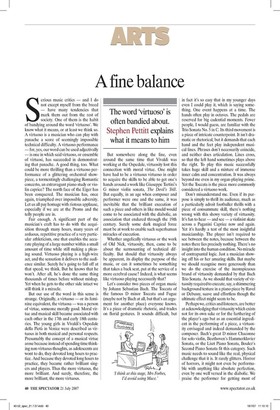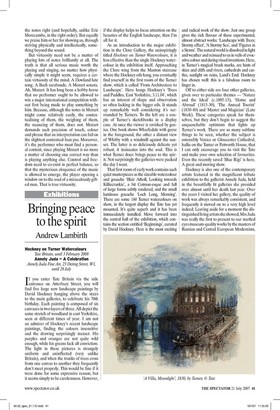A fine balance
11. The word 'virtuoso' is often bandied about. Stephen Pettitt explains what it means to him Serious music critics — and I do not except myself from the breed — have many tendencies that mark them out from the rest of society. One of them is the habit of bandying around the word 'virtuoso'. We know what it means, or at least we think so. A virtuoso is a musician who can play with panache a score of seemingly impossible technical difficulty. A virtuoso performance — for, yes, our word can be used adjectivally — is one in which said virtuoso, or ensemble of virtuosi, has succeeded in demonstrating that panache. A good thing, too. What could be more thrilling than a virtuoso performance of a glittering orchestral showpiece, a tormentingly challenging Romantic concerto, an extravagant piano study or violin caprice? The north face of the Eiger has been conquered. The musician has, once again, triumphed over impossible adversity. Let us all pay homage with riotous applause, especially if we are at the Proms and the telly people are in.
Fair enough. A significant part of the musician's craft has to do with the acquisition through many hours, many years of arduous, repetitive practice of a very particular athleticism, one that enables the accurate playing of a large number within a small amount of time while still making a pleasing sound. Virtuoso playing is a high-wire act, and the sensation it delivers to the audience similar. Surely he's going to fall off at that speed, we think. But he knows that he won't. After all, he's done the same thing thousands of times before without mishap. Yet when he gets to the other side intact we still think it a miracle.
But our use of the word in this sense is strange. Originally, a virtuoso — or its feminine equivalent, the virtuosa — was a person of virtue, someone morally good. Moral virtue and musical skill became associated with each other in the 17th and early 18th centuries. The young girls in Vivaldi's Ospedale della Pieta in Venice were described as virtuous in both musical and personal respects. Presumably the concept of a musical virtue arose because instead of spending time thinking non-virtuous thoughts, as adolescents are wont to do, they devoted long hours to practice. And because they devoted long hours to practice, they became rather brilliant singers and players. Thus the more virtuous, the more brilliant. And surely, therefore, the more brilliant, the more virtuous.
But somewhere along the line, even around the same time that Vivaldi was working at the Ospedale, virtuosity lost this connection with moral virtue. One might have had to be a virtuous virtuoso in order to acquire the skills to be able to get one's hands around a work like Giuseppe Tartini's G minor violin sonata, The Devil's Trill. But equally, in an age when composer and performer were one and the same, it was inevitable that the brilliant execution of such a piece and others in like mould would come to be associated with the diabolic, an association that endured through the 19th century. Surely some dark magical force must be at work to enable such superhuman miracles of execution.
Whether angelically virtuous or the work of Old Nick, virtuosity, then, came to be about the surmounting of technical difficulty. But should that virtuosity always be apparent, its display the purpose of the music, or can it sometimes be something that takes a back seat, put at the service of a more cerebral cause? Indeed, is what seems like virtuoso playing necessarily that?
Let's consider two pieces of organ music by Johann Sebastian Bach. The Toccata of the famous D minor Toccata and Fugue (maybe not by Bach at all, but that's an argument for another place) everyone knows. It's a piece of dramatic rhetoric, and trades on florid gestures. It sounds difficult, but in fact it's so easy that in my younger days even I could play it, which is saying something. One event happens at a time. The hands often play in octaves. The pedals are reserved for big cadential moments. Fewer people, I would guess, are familiar with the Trio Sonata No. 5 in C. Its third movement is a piece of intricate counterpoint. It isn't dramatic or rhetorical, but it demands that each hand and the feet play independent musical lines. Phrases don't necessarily coincide, and neither does articulation. Lines cross, so that the left hand sometimes plays above the right. To play this music successfully takes huge skill and a mixture of immense inner calm and concentration. It was always beyond me even in my organ-playing prime. Yet the Toccata is the piece more commonly considered a virtuoso work.
Don't misunderstand me. Even if its purpose is simply to thrill its audience, much as a particularly adroit footballer thrills with a piece of consummate skill, there's nothing wrong with this showy variety of virtuosity. It's fun to hear — and see — a violinist skate across a Paganini Caprice now and again. Yet it's hardly a test of the most insightful musicianship. The player isn't required to see between the notes, because between the notes there lies precisely nothing. There's no insight into the human condition. No miracle of contrapuntal logic. Just a musician showing off his or her amazing skills. But maybe we should recognise more generously than we do the exercise of the inconspicuous brand of virtuosity demanded by that Bach Trio Sonata. As we should that variety of virtuosity required to execute, say, a shimmering background texture in a piano piece by Ravel or Debussy, suave and effortless though the ultimate effect might seem to be.
Perhaps we, critics and listeners, are better at acknowledging that virtuosity which exists not for its own sake or for the furthering of the player's ego but as an essential ingredient in the performing of a piece, a virtuosity envisaged and indeed demanded by the composer. Bach's great D minor Chaconne for solo violin, Beethoven's Hammerklavier Sonata, or the Liszt Piano Sonata, Boulez's Second Piano Sonata fit this category. Such music needs to sound like the real, physical challenge that it is. It rarely glitters. Horror of horrors, it might not even be performable with anything like absolute perfection, even by one well versed in the diabolic. We praise the performer for getting most of the notes right (and hopefully, unlike Eric Morecambe, in the right order). But equally we praise him or her for showing us, through striving physically and intellectually, something beyond the sound.
But virtuosity need not be a matter of playing lots of notes brilliantly at all. The truth is that all serious music worth the playing and singing, no matter how physically simple it might seem, requires a certain virtuosity of the mind. A Dowland lute song. A Bach sarabande. A Mozart sonata. Ah, Mozart. It has long been a hobby-horse that no performer ought to be allowed to win a major international competition without first being made to play something by him Because, although the notes in Mozart might come relatively easily, the contextualising of them, the weighing of them, the nuancing of them, does not. Mozart demands such precision of touch, colour and phrase that an interpretation can fail on the slightest contextual faux pas. Moreover, it's the performer who must find a personal context, since playing Mozart is no more a matter of choosing one correct way than is playing anything else. Control and freedom need to co-exist in perfect balance, so that the mysterious eloquence of the music is allowed to emerge, the player opening a window on to the soul of a miraculously gifted man. That is true virtuosity.













































 Previous page
Previous page